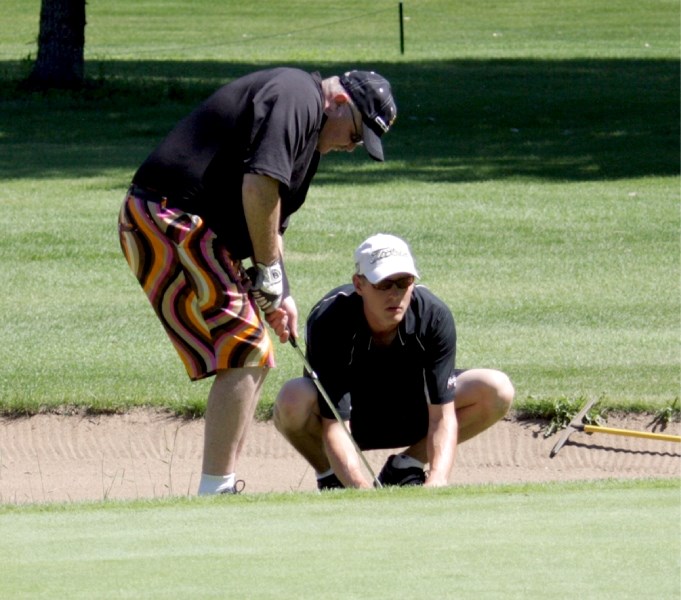To be able to golf requires a good set of eyes, but it turns out those eyes don’t have to belong to the person wielding the club.
Blind golf is exactly as it sounds — golf for those who are either partially or completely visually impaired and need the assistance of a partner or caddy to get the ball close to and in the hole.
The Westlock Golf Course hosted the 2011 Western Canadian Blind Golf Tournament July 25-27, drawing in 17 golfers from across the country to compete against their peers.
Brian MacLeod came all the way from Truro, N.S. with his caddy Brian Smith to compete.
The two Brians have been a team since 2001, Smith said, except for a recent three-year gap when Smith was in Alberta and MacLeod was still on the east coast. Still, the two have developed a special kind of relationship on the course.
“It’s a unique bond between the player and the coach,” MacLeod said. “He gives the distance to the hole and helps to aim toward the hole. There’s a lot of trust involved.”
He added that he likes to think of the arrangement as a case of dividing the game into two different, yet complementary components.
“He’s playing the game,” he said. “I’m just swinging the club. It’s a team effort.”
On the course, both men talk to each other leading up to each shot, as Smith describes for MacLeod what obstacles are in the way and how hard to hit the ball. Smith will then help aim MacLeod, who will hit the ball. They repeat the process until the ball is in the hole.
When preparing to putt on the green, Smith will walk MacLeod from the hole to the ball, to give him a feel for the distance, as well as to allow him to feel the contours on the green and which way the ball could roll.
The first time they worked together, Smith said he was amazed with how well MacLeod could hit the ball. That likely comes from the fact MacLeod had been golfing for many years before he lost his sight in the mid-1990s.
MacLeod’s descent into blindness started with a hockey accident. He took a puck to the eye, he said, which made him lose his sight in one eye.
He lost his sight in his other eye in a workplace accident, rendering him completely blind.
“I didn’t think I would play again,” he said.
However, in 1997 he discovered blind golf and has been playing ever since.
In working with Smith and other caddies over the years, MacLeod said he thinks it’s the caddies who learn more about the game when working with blind golfers than the golfers do. He chalks this up to the fact they need to think about the shots needed from the perspective of players who can’t see the course themselves.
In attendance at the coaching clinic held on July 25 before the tournament started was 11-year-old Justin Wack from St. Albert.
Wack has been blind since birth, but hasn’t let that hinder his lifestyle, which includes being active in many sports, including golf, which he only picked up four years ago.
“It was hard when I first tried it, but I hope to keep doing it,” he said. “It’s a fun game.”
Having been born blind, Wack said he experiences the world much like a sighted person would, except for the fact he can’t actually see it. He added he doesn’t think it’s true that his other senses have been heightened because he can’t see, but instead they have merely adapted to account for his lack of vision.
Wack and MacLeod established a bit of a connection during the clinic, and it gave Wack some insight into what it would be like to have lost his sight compared to having never had it in the first place.
“I think it would definitely be harder to lose my sight,” he said.
When asked if he would want to be able to see the world, Wack was unequivocal in his response.
“I wouldn’t take sight if I could,” he said. “I like being blind.”



